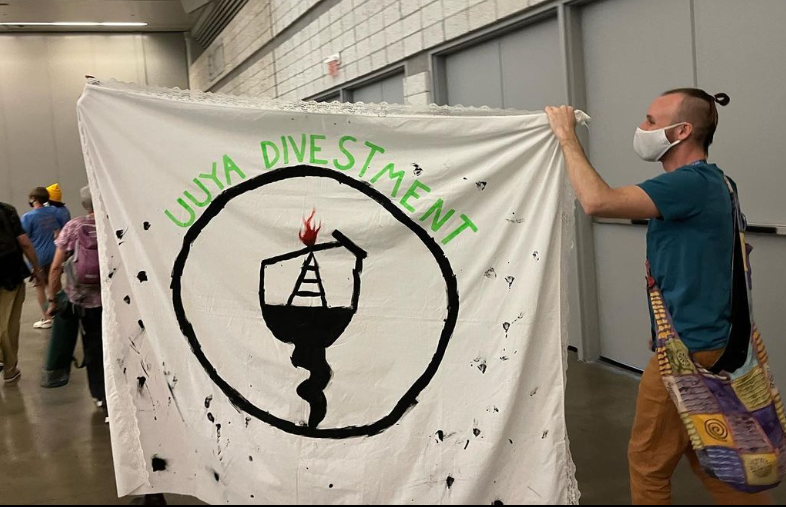 The UU Church of Akron, like most UU churches, is a member of the Unitarian Universalist Association. Every June, UUs from congregations across the association gather at a conference called General Assembly (GA), where we conduct business of the association, explore the theological underpinnings of our faith, and lean fully into our mission.
The UU Church of Akron, like most UU churches, is a member of the Unitarian Universalist Association. Every June, UUs from congregations across the association gather at a conference called General Assembly (GA), where we conduct business of the association, explore the theological underpinnings of our faith, and lean fully into our mission.
Every congregation in the association chooses delegates to attend and represent them at GA. The number of delegates is based on the size of the congregation. We, at UUCA, sent five delegates: Sandy Auburn, Sarah Culver, Bay Gaillard, Sharon McWhorter and Derek Shuttleworth.
Earlier this year our UUCA Board of Trustees updated the policy on the delegate procedures and determined that each delegate would gather information, talk to congregants, and then ultimately follow their conscience when the time came to cast their vote. The policy reflects how UUCA has worked with delegates for the last ten years; we have not held congregational votes, for example, to tell our delegates how to vote, nor have we even informally attempted to force them to vote as one.
In addition to holding coffee hour conversations and stone soup chats, a survey was sent out to the congregation for those who wanted to share their thoughts on the ballot issues with the delegates. Less than 10 percent of our congregation participated in that survey. While those thoughts were certainly heard, with such small participation, it is clear our congregation trusted that the delegates we elected would represent us well.
There were three very significant votes held at GA: We elected a new President of our Association, we voted on a business resolution, “Complete Divestment from the Fossil Fuel Industry and Subsequent Reparations,” and we voted whether or not to continue discussing the proposed changes and amendments to Article II of the UUA Bylaws.
The Vote for President of our Association
 According to the bylaws of our UU Association, two candidates must be put forth from the nominating committee for consideration of the office of President. Other candidates are allowed to campaign as write-in candidates without any input from the nominating committee so long as they meet the criteria for candidateship. The nominating committee put forth two candidates, but one of them withdrew quickly following their nomination. With no write-in candidates, Sofia Betancourt ran unopposed. Still, Sofia remained diligent in her campaign, sharing her vision.
According to the bylaws of our UU Association, two candidates must be put forth from the nominating committee for consideration of the office of President. Other candidates are allowed to campaign as write-in candidates without any input from the nominating committee so long as they meet the criteria for candidateship. The nominating committee put forth two candidates, but one of them withdrew quickly following their nomination. With no write-in candidates, Sofia Betancourt ran unopposed. Still, Sofia remained diligent in her campaign, sharing her vision.
Rev. Dr. Betancourt, who holds a Ph.D. in Religious Ethics and African American Studies from Yale University and an M.Div. from Starr King School for the Ministry, was elected with 2,320 yes votes (95.5 percent) and 110 no votes (4.5 percent). The child of immigrants from Panamá and Chile, and the grandchild of a seventh-generation Unitarian, Rev. Dr. Betancourt begins her six-year tenure on July 10. Of her priorities as President, she stated, “I believe in a Unitarian Universalism that draws on its noble heritage of freedom, reason, and justice to be nimble in responding to the needs of our faith community. While we cannot know what will come in the next six years, we can commit ourselves to radical inclusion, faithful witness, and the embrace of a wide range of voices and leaders for our faith. Together we will empower youth and young adult leadership, encourage collaboration across our communities and congregations, deepen our theological engagement, and invest in religious leaders of all kinds. All this while dedicating ourselves to the work of justice in the world.” You can read more about her vision and campaign at her website, https://sofiabetancourt.com/
Business Resolution on Divestment
 Two years ago, a business resolution was passed asking the UU General Endowment Fund to divest of all fossil fuels, which almost, but did not quite happen. Many investments were left in place through a few loopholes: the existence of “shareholder advocacy funds,” whose functionality is hotly debated, and the existence of combined funds that do not report their conformity to any outside list of ethical priorities. Last year, a responsive resolution was proposed by the Young Adult Caucus in response to the budget asking for those last few funds to be divested, but the responsive resolution was deemed to be non-binding, and it was recommended that the YAs come back with a business resolution. Throughout the year, many attempts were made by the YAs to connect with the General Endowment Fund, but they stood steadfast in saying that they needed those funds in order to make a profit. Therefore, a business resolution was proposed in order to demand both full divestment and reparations for the profits made unethically during this period. However, there was some language in there that was objectionable to the Endowment Fund caretakers, and they urged congregants to vote “No” so that they could handle reparations differently than the way the YAs proposed. There appear to have been several individuals who dropped the ball on communicating between the two groups, and so the proposal came to a vote without being satisfactory to both parties.
Two years ago, a business resolution was passed asking the UU General Endowment Fund to divest of all fossil fuels, which almost, but did not quite happen. Many investments were left in place through a few loopholes: the existence of “shareholder advocacy funds,” whose functionality is hotly debated, and the existence of combined funds that do not report their conformity to any outside list of ethical priorities. Last year, a responsive resolution was proposed by the Young Adult Caucus in response to the budget asking for those last few funds to be divested, but the responsive resolution was deemed to be non-binding, and it was recommended that the YAs come back with a business resolution. Throughout the year, many attempts were made by the YAs to connect with the General Endowment Fund, but they stood steadfast in saying that they needed those funds in order to make a profit. Therefore, a business resolution was proposed in order to demand both full divestment and reparations for the profits made unethically during this period. However, there was some language in there that was objectionable to the Endowment Fund caretakers, and they urged congregants to vote “No” so that they could handle reparations differently than the way the YAs proposed. There appear to have been several individuals who dropped the ball on communicating between the two groups, and so the proposal came to a vote without being satisfactory to both parties.
The resolution was not adopted, with 1,412 votes (68.3 percent) against and 654 (31.7 percent) in favor. In a moving demonstration of young adult UUs living their values, a group in favor of the business resolution held signs and chanted at the end of a discussion during General Session. UUA leaders, including Rev Dr Betancourt, vowed to remain in conversation with the young adults, recognizing that their voices are integral to these complex and difficult issues. The Young Adult Caucus will no doubt hold them to this promise. You can find out more about the movement to divest here: https://linktr.ee/uuyadivestment
Article II Proposed Changes and Amendments
 The UUA Bylaws require us to renew Article II, the section of the bylaws that defines our faith and the purpose of the UUA, every 15 years. This is so that we do not become dogmatic or adopt the faith tenants in there as a creed, but continue to refresh and renew them to meet the challenges of each new generation of UUs. The last major change was in 1984 with the adoption of the 7 Principles, before many of your young adult UUs were born. The change before then was in 1961 when the Unitarians and the Universalists first merged; at that time, many compromises were made to allow the merger to proceed.
The UUA Bylaws require us to renew Article II, the section of the bylaws that defines our faith and the purpose of the UUA, every 15 years. This is so that we do not become dogmatic or adopt the faith tenants in there as a creed, but continue to refresh and renew them to meet the challenges of each new generation of UUs. The last major change was in 1984 with the adoption of the 7 Principles, before many of your young adult UUs were born. The change before then was in 1961 when the Unitarians and the Universalists first merged; at that time, many compromises were made to allow the merger to proceed.
The Article II Study Commission consulted with over 10,000 UUs, including doing focus groups specifically on youth and young adults, to try and find a branding for our values that matches who we are today instead of who we were in the 1980s. After two years of study, they submitted their report to the UUA in January, 2023. A congregational engagement and amendment process began, and at GA, delegates voted to move forward with a process to discuss further proposed changes to Article II of the UUA bylaws, with 1,816 (86.3 percent) votes in favor and 289 (13.7 percent) against. Several amendments to the proposal package were approved during GA. A final vote on the proposed changes requires a two-thirds vote to pass next year at GA 2024. A copy of the proposed changes and amendments can be found here.
Conclusion
We wish to thank all of our delegates for their commitment to the process (and there was a lot to process). It is not always easy to wade through the minutiae of various proposals when so often it is clouded with strong opinions and emotions. We are grateful for our delegates who served this year.
For those who love to dig into that minutia, you can go down the rabbit hole starting HERE on the UUA site. Many of the videos will remain available through the end of August.
